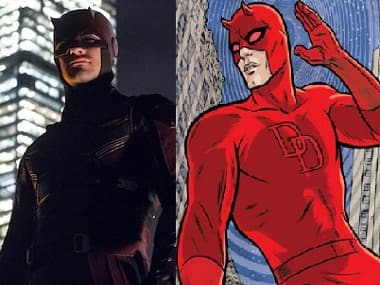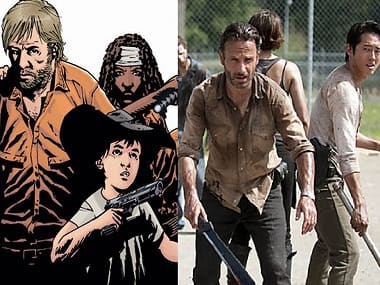“No sermon today. You’re welcome for that.” On 22 May, television audiences heard Jesse Custer ironically utter these words on AMC’s brand-new Preacher, as the antithesis for superheroes in spandex saving the world. Based on Garth Ennis’s 1995 comic series of the same name, and the latest comic book-to-small screen adaptation, Preacher is being hailed by book fans and new viewers as the next big thing on TV, even bigger than Breaking Bad. Rejoice, comic book fans everywhere! [caption id=“attachment_2815280” align=“alignleft” width=“380”]  Preacher; on screen and page[/caption] It’s a good time to be a nerd. We’re living in times where an explosion in the superhero genre on the big and small screens, is the order of the day. Television, especially cable TV, has allowed creators the freedom to wholeheartedly imbibe the tone and spirit of the original comic books (most of which have violent and sexual overtones), and add a darker, more menacing quality to the screen adaptations. And the list is endless: Marvel has the Agents of S.H.I.E.L.D, Daredevil, and Jessica Jones, as well as the upcoming Luke Cage, The Punisher, Cloak and Dagger, and Iron Fist; DC has Gotham, Arrow, The Flash, and Legends of Tomorrow. Based on their popularity, many of these have gotten it right; elements of certain shows have also received critical acclaim, as evidenced by Daredevil’s action sequences, Jessica Jones’ neo-noir feminist leanings, and The Flash’s humour. The superhero movies/TV shows are here to stay. And like bacon-wrapped prawns and celebrity gossip, they are super addictive! There are, of course, the non-superhero comic book-to-small screen adaptations that have been gaining widespread appeal and cult-like followings too. AMC’s The Walking Dead arguably leads the pack in this category. The articles written, the arguments had, the listicles created, the pints drunk during debates, and the audience reactions to one character’s fate on the show, are testament to this. If AMC’s track record and ratings for Preacher are anything to go by, it looks like the network has another hit on its hands, taking over the mantle of successful comic book-to-small screen adaptations during The Walking Dead off-season. [caption id=“attachment_2815290” align=“alignright” width=“380”]  TV’s Daredevil, and the comic books’[/caption] The undead are definitely popular. Another case in point is iZombie. A refreshingly amusing variation on the zombie trend, it’s another exciting adaptation from the non-superhero comic book genre (it’s loosely based on the comic book series of the same name created by Chris Roberson and Michael Allred, published by DC Comics). Created by Veronica Mars’ Rob Thomas, iZombie is a dramedy/crime procedural where zombies and humans engage in witty banter and dazzling post-zombie-apocalypse satire. Here’s the premise: Girl is an aspiring doctor, engaged to a great guy. Girl attends a boat party where she gets scratched by a zombie and turns into one herself. Girl needs to feed on human brains to survive; she uses her medical experience to work at the local morgue where she eats victim brains that come in, temporarily inherits their personality traits, and experiences flashbacks. Girl uses this new ability to help the Seattle Police Department solve crimes, passing herself off as a psychic consultant. For two seasons, audiences have watched Liv Moore (she’s a zombie with a name that’s a playful twist on “Live More”) use her undead status to be a kickass crimefighter without having to adhere to typical superhero tropes. She’s a witty post-modern feminist who makes a very tangible difference in the world she lives in. Her love life, although an important plotline, feels incidental in her greater quest to find the people who introduced the zombie virus in humans, and bring them to justice. All hail the “shero”! Female protagonists are a somewhat rare breed in the world of comics. Unlike anime or Japanese manga, a woman or a group of women rarely constitute the chief narrative structure of Western comics. Which is why, a lead female superhero or a female crime-fighting zombie is great news. What would be even more terrific is a comic book with a female non-superhero, non-zombie protagonist being adapted for television. Who wouldn’t love to see Runways on the small screen or watch a matriarchal Grace Briggs taking on the US federal government? Harrow County, Bitch Planet and Hark! A Vagrant are tailor-made for small screen adaptations, and can someone (read Netflix) please bring Fumi Yoshinaga’s incredible manga Ōoku: The Inner Chambers, about a female shogun in an alternate medieval Japan, to the small screen? Or the feminist space opera The Ballad of Halo Jones? Hey, if the legend Alan Moore set it up for us, we’d be foolish not to. [caption id=“attachment_2815296” align=“alignleft” width=“380”]  The Walking Dead crew, headed by Rick Grimes[/caption] Leaving aside any feminist agendas, a general increase in non-superhero comics is good news. Alan Moore effectively wrote the end of the superhero with Watchmen and Miracleman, but 30 years later, we’ve come full circle back to superheroes again. The Walking Dead, iZombie, the short-lived The Middleman, and now Preacher and Outcast have got enough people looking at comics that are not dependent on superheroes. Can we also add offbeat hits like the board-game worthy Kill Shakespeare and the already-epic The Fifth Beatle to this list please? For the uninitiated, the former is a comic that has some of the Bard’s greatest heroes (Hamlet, Juliet, Othello, Falstaff) take on his most notorious villains (Richard III, Lady Macbeth, Iago) in an adventure to find, kill or save a reclusive wizard named William Shakespeare, while Vivek Tiwary’s ode to Brian Epstein is a rock and roll homage like none other. I mean, come on, just take my money already! Superhero comic book adaptations to television will continue, and it’s great to see networks giving them the kind of discerning treatment that Netflix has given Marvel’s Daredevil and Jessica Jones. It bodes well for comic book fans and artists/writers. Good times are ahead, and long live nerd culture.
Comic book adaptations are ruling the roost when it comes to the small screen, from Preacher to Daredevil, Legends of Tomorrow
Advertisement
End of Article


)
)
)
)
)
)
)
)
)



